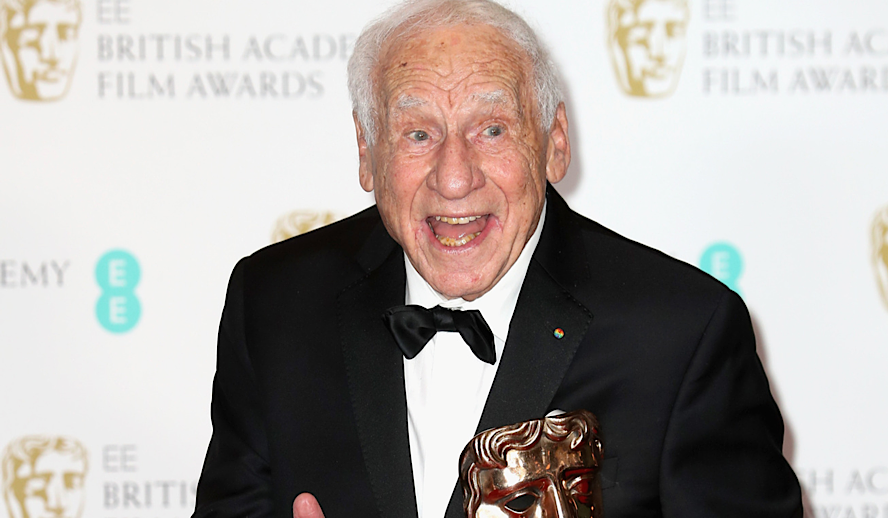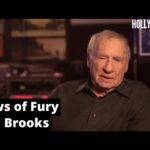Table of Contents

Photo: Mel Brooks
“Punching up” is one of the unspoken rules of comedy, of what makes comedy important during hard times. Punching up is when a comedian uses comedy, from jokes to slapstick to characters, to criticize those in power. Punching up is the equivalent of the nerdy kid making fun of the massive bully, using their wit as a weapon over their fists. This is where comedian and director, Mel Brooks, succeeds. Mel Brooks has always been interested in using comedy as a weapon, using farce to reveal the stupidity of prejudice and corruption. With the classic films ‘The Producers’, ‘Blazing Saddles’, and ‘Spaceballs’, Mel Brooks uses various forms of comedy to punch up, to reveal the weaknesses of the bullies in power.
Related article: EXCLUSIVE: ‘Dune’ Full Commentary, Reactions, Making Of – Timothee Chalamet, Zendaya, Oscar Isaac
Related article: ‘House of Gucci’ Full Commentary & Behind the Scenes – Lady Gaga, Adam Driver, Jared Leto, Al Pacino
Mel Brooks – ‘The Producers’ and Fascism
Brooks’ 1967 film, ‘the Producers’, follows a theater producer (Zero Mostel) and nervous accountant (Gene Wilder) who tries to stage the worst musical ever to scam the investors. To create the worst musical, the duo puts on a musical written by an ex-Nazi (Kenneth Mars), “Springtime for Hitler”. To their surprise, the offensive musical actually becomes successful with audiences. Brooks, as a Jewish man who fought in WWII, has said before that he wanted the musical within the film to be about Hitler to make fun of anti-Semitism, specifically making fun of the Nazi party. He believed that the best way to expose the Nazi party and get back at them was to knock them down a peg through good old ridicule and humor.
The fictional musical “Springtime for Hitler” pokes fun of the theatrics of Nazi propaganda, having the choreography of the musical match many of the demonstrations as seen in Leni Riefenstahl’s propaganda film ‘Triumph of the Will’. The theatrics that the Nazis show in ‘Triumph of the Will’, like marching in the shape of a swastika, is parodied in “Springtime for Hitler” by making it a big, silly dance number. The theatrics of the Nazi party that showcased their conformity and discipline are turned into a goofy and campy dance number that the audience laughs at.
Related article: EVOLUTION: Every Henry Cavill Role From 2001 to 2021, All Performances Exceptionally Poignant
Related article: EVOLUTION: Every Chris Evans Role From 1997 to 2020, All Performances Exceptionally Poignant
This conformity is also parodied in the musical number, with each actor looking and dressing similarly, all moving as one and of course being white and blonde. The fictional musical also makes fun of the hyper-nationalism of Nazis by having the women humorously dressed like beer jugs and pretzels, two German stereotypes. While the fictional “Springtime for Hitler” musical is a silly parody of how the Nazis presented themselves in propaganda, the fictional creator of the musical is a satire of the actual reality of ex-Nazis.
“Springtime for Hitler” is a love letter to the Nazis from Kenneth Mars’ character, Franz Liebkind. Despite the musical being produced to fail, it was written with sincerity by Franz; it is his vision of the Nazi party he loves so much. This only adds more to the satire of the theatrics of the Nazi party, since the goofy musical is written through the lens of an actual Nazi, meaning that he too wants to be seen as that absurd. Franz Liebkind is also a humorous and negative portrayal of ex-Nazis who fought in the war.
Franz is a deranged basket case who lives with pigeons and still believes that the war is going on. He is sloppy, ill-tempered, and paranoid. Franz is the exact opposite of how Nazis view themselves as being both pathetic and a failure. By being the opposite of how Nazis view themselves, Franz is a portrayal of the reality of Nazis, being a loser who lost the war yet is still stuck in their own ideologies. By portraying Nazis as pathetic people who are still living in their deranged fantasies, Mel Brooks is taking the power from them by knocking them down a peg.
Related article: MUST WATCH – The Hollywood Insider’s CEO Pritan Ambroase’s Love Letter to Black Lives Matter – VIDEO
Subscribe to The Hollywood Insider’s YouTube Channel, by clicking here.
The popularity of “Springtime for Hitler” acts as a surprise to the characters, who made the musical fail on purpose, but also acts as a commentary on how the gentile audience view anti-Semitism. Gentile audiences, audiences who do not identify as Jewish, can often overlook signs of anti-Semitism in the media. Even audiences who consider themselves liberal and socially aware can find themselves entertained by media that the Jewish people find problematic, such as Fellini’s controversial ‘Life is Beautiful’. This is seen in ‘the Producers’ with the audience loving “Springtime for Hitler”, laughing and cheering during intermission as our protagonists are horrified, both because their plan failed and because the audience loves a pro-Hitler musical written by a deranged Nazi.
‘Blazing Saddles’ and Racism
There is a false narrative thrown around today that you couldn’t make ‘Blazing Saddles’ today because of “PC culture” yet those who say this seem to not understand what ‘Blazing Saddles’ is about (or they never really saw it). ‘Blazing Saddles’ is often remembered by these people for its liberal use of the n-word and not for its commentary on racism. Brooks’ 1974 western, co-written by comedian Richard Pryor, is about a black railroad worker, Bart (Cleavon Little), who becomes the first black sheriff for a racist town. The film uses this concept, the idea of a black man being the only one who can protect a racist town from corruption, and the Looney Tunes styled cleverness of Bart to satirize the absurd reality of racism.
Limited Time Offer – FREE Subscription to The Hollywood Insider
The character of Bart is a trickster similar to the likes of Bugs Bunny, often using people’s racism against them to make them look like fools. This is best seen when Bart and his fellow railroad workers are asked to sing a “slave song” and Bart, pretending not to know any slave songs, causes his white bosses to sing slave songs, resulting in the two groups switching roles. Bart is fully aware of how he is perceived and treated by the white people in power and fights them off through trickery and comedy.
His schemes, still tricking the racist people in power, is eventually what ends up saving the town that he becomes sheriff of, such as in this scene. Here, Bart uses the stereotype started from the KKK film, ‘the Birth of a Nation’, that black men are a danger to white women, as bait. With this bait, he and his partner, Jim (Gene Wilder), then beat up the KKK members and steal their identities as a disguise. Perhaps this disguise sadly gave Bart power, illustrating the power that white supremacists hold. Bart uses the racism of others to make themselves look stupid, taking the power away from them and exposing their own ignorance.
While Bart uses the racism of others to trick and expose them, the film also shows that Bart is an asset to the racist town that once rejected him. The town at first sees Bart as a threat, even ducking when he takes out his speech, believing it is a weapon. In reality, the real villain of the film is the trusted attorney general, Hedley Lamarr (Harvey Korman) who tries to force the townspeople to leave with staged crimes. This plot line acts as a satire of our reality, where society sees black people as the enemies despite the privileged white men in power often being the real enemies. The real enemy is right under the town’s nose, but while they respect Hedley, who wants the worst for them, they fear Bart, who only wants the best for them. In the end, when Bart saves the day, not only is Bart portrayed as the hero but the town is portrayed as being foolish for letting their racism impede them from seeing the truth.
Related article: The Hollywood Insider’s CEO Pritan Ambroase: “The Importance of Venice Film Festival as the Protector of Cinema”
Related article: The Masters of Cinema Archives: The Hollywood Insider Pays Tribute to ‘La Vie En Rose’, Exclusive Interview with Director Olivier Dahan
Related article: – Want GUARANTEED SUCCESS? Remove these ten words from your vocabulary| Transform your life INSTANTLY
‘Spaceballs’ and Political Corruption
1987’s ‘Spaceballs’ may just seem like Mel Brooks’ take on the popular ‘Star Wars’ franchise, but the film does more than just make fun of movie commercialism. The film also takes aim at political corruption, portraying the working class in this world as the noble heroes and the privileged politicians in power as the nefarious yet pathetic villains who need to be beaten. The film follows a similar plot to ‘Star Wars’, focusing on good versus evil where the good are working class goofs (Bill Pullman and John Candy) and the evil are the corrupt leaders of Planet Spaceball.
One could argue that the parody is more of a political satire because of the underlying political undertones in the original ‘Star Wars’ film, with the Stormtroopers having visual similarities to Nazis and Darth Vader being comparable to Hitler. Mel Brooks pushes this up a notch by having the villains of ‘Spaceballs’, President Scrooge (Brooks), and Dark Helmet (Rick Moranis) have political power. The duo’s evil scheme is a satire of both environmentalism and colonialism. After President Scrooge’s planet no longer has fresh air because of pollution, he and Dark Helmet decide to literally steal air from other planets for their own planet.
This is a satire of environmentalism since President Scrooge has endangered his own planet so badly that his planet has literally lost all of its fresh air. The plot point of stealing air from other planets can be easily compared to colonialism, where countries steal land from other countries for their own benefit. These villains are portrayed as being buffoonish though, often being the butt of the film’s jokes. By portraying these corrupt politicians as buffoons and comparing them to Darth Vader, one of the film’s most notorious villains, Mel Brooks is commenting on real politicians’ own corruption by exposing its buffoonery.
Related article: #metoo Revolution: Powerful Questions That Need Answers
Related article: FACT-CHECKED Series: Timothee Chalamet and 32 Facts about The Young Superstar
Conclusion
Mel Brooks is known as one of the greatest comedy directors of all time and for good reason. While not all of his jokes have aged well, since comedy is the quickest art form to age poorly because of ever-changing social standards, Brooks always had something to say. Whether it was making fun of Nazis or racism or political corruption, Brooks didn’t just want to make jokes for the sake of getting an easy laugh. Brooks used comedy as a weapon, a pen instead of a sword, to get back at unjust systems through ridicule and satire. Mel Brooks once said, “The comedy writer is like the conscience of the king. He’s got to tell him the truth. And that’s my job: to make terrible things entertaining.” Mel Brooks tells the truth about our society in his films but makes it funny to both get back at the unjust systems and to speak this truth to an audience who needs to listen.
By Brianna Benozich
Click here to read The Hollywood Insider’s CEO Pritan Ambroase’s love letter to Black Lives Matter, in which he tackles more than just police reform, press freedom and more – click here.
An excerpt from the love letter: The Hollywood Insider’s CEO/editor-in-chief Pritan Ambroase affirms, “The Hollywood Insider fully supports the much-needed Black Lives Matter movement. We are actively, physically and digitally a part of this global movement. We will continue reporting on this major issue of police brutality and legal murders of Black people to hold the system accountable. We will continue reporting on this major issue with kindness and respect to all Black people, as each and every one of them are seen and heard.
Just a reminder, that the Black Lives Matter movement is about more than just police brutality and extends into banking, housing, education, medical, infrastructure, etc. We have the space and time for all your stories. We believe in peaceful/non-violent protests and I would like to request the rest of media to focus on 95% of the protests that are peaceful and working effectively with positive changes happening daily. Media has a responsibility to better the world and The Hollywood Insider will continue to do so.”
Ways to support Black Lives Matter Movement to end systemic racism
More Interesting Stories From The Hollywood Insider
– Want GUARANTEED SUCCESS? Remove these ten words from your vocabulary| Transform your life INSTANTLY
– Compilation: All James Bond 007 Opening Sequences From 1962 Sean Connery to Daniel Craig
– Do you know the hidden messages in ‘Call Me By Your Name’? Find out behind the scenes facts in the full commentary and In-depth analysis of the cinematic masterpiece
– A Tribute To The Academy Awards: All Best Actor/Actress Speeches From The Beginning Of Oscars 1929-2019 | From Rami Malek, Leonardo DiCaprio To Denzel Washington, Halle Berry & Beyond | From Olivia Colman, Meryl Streep To Bette Davis & Beyond
– In the 32nd Year Of His Career, Keanu Reeves’ Face Continues To Reign After Launching Movies Earning Over $4.3 Billion In Total – “John Wick”, “Toy Story 4”, “Matrix”, And Many More
Mel brooks, Mel brooks, Mel brooks, Mel brooks, Mel brooks, Mel brooks, Mel brooks, Mel brooks, Mel brooks, Mel brooks, Mel brooks, Mel brooks, Mel brooks, Mel brooks, Mel brooks, Mel brooks, Mel brooks, Mel brooks, Mel brooks, Mel brooks, Mel brooks

Brianna Benozich is a writer for The Hollywood Insider and a stand up comedian. With a background in screenwriting, she believes that every good story relies on character, story, and themes. Brianna believes that these components, especially with comedies, can start necessary conversations and even open the minds of the audience. She strives to bring attention to underrepresented and overshadowed films and television series which align with the core values of Hollywood Insider’s mission to provide meaningful and compelling stories.








